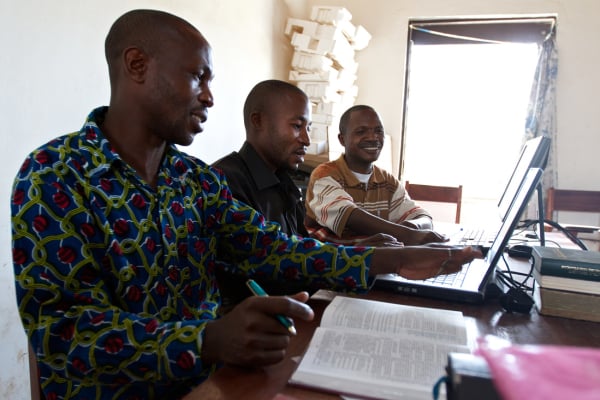
November 14, 2012
The Necessity of All Professions
Read the series: Part 1 | Part 2 | Part 3 | Part 4 | Part 5 | Part 6
It seems like a no-brainer to say that we need the entire Body of Christ to accomplish Jesus’ disciple-making mandate. Yet it sometimes seems much of the church still thinks that the task is primarily assigned to those religious workers specifically trained to do vocational Christian ministry. Without minimizing such critical and historical ministry, this second article about disciple-makers from all professions briefly explores some New Testament examples of church expansion through ordinary believers.
It seems like a no-brainer to say that we need the entire Body of Christ to accomplish Jesus’ disciple-making mandate. Yet it sometimes seems much of the church still thinks that the task is primarily assigned to those religious workers specifically trained to do vocational Christian ministry. Without minimizing such critical and historical ministry, this second article about disciple-makers from all professions briefly explores some New Testament examples of church expansion through ordinary believers.
The Necessity of All Professions
by Dale Losch, President of Crossworld
Fully 60 percent of the world’s population today — 4.2 billion people — live in countries where foreigners can no longer obtain religious-worker visas. And least-reached people live in virtually every one of these restricted areas. That fact alone should alert us to the necessity of mobilizing the whole body of Christ (with its full diversity of professional skills) to go to the nations as disciple-makers.
Yet geo-political realities and statistical analyses are not the primary reason we should be sending godly Christ-followers from secular professions to make disciples. The primary reason is that Scripture itself mandates and models it.
A quick survey of the book of Acts reveals that many, if not most, of those who took the gospel to the nations were lay people, supported by their professions.
The first missionary-sending church was started by average believers who scattered as a result of Stephen’s persecution (Acts 11:19). These believers came to Antioch and began sharing the gospel with non-Jews. “The hand of the Lord was with them, and a large number who believed turned to the Lord” (v.21). Later, the Jerusalem church sent Barnabas who eventually invited Saul’s help, and for one year they taught the new church before being commissioned to take the gospel elsewhere.
How about the church-planting effort in Macedonia and Achaia? Speaking to the Thessalonian Christians, Paul wrote, “You also became imitators of us and of the Lord Jesus… In every place your faith toward God has gone forth so that we have no need to say anything!” (1 Thessalonians 1:6-8). Church planting in the whole region took place largely as a result of ordinary believers proclaiming the gospel.
When the Spirit of God gave birth to the Gentile church in Caesarea, there was almost no assistance from trained religious professionals, except for the apostle Peter. Then, instead of settling in to establish the Gentile church at this critical juncture, Peter was asked “to stay on for a few days” (Acts 10:48). A few days! These were untrained Gentiles! What about establishing them in correct church government and trained leadership and strategic outreach? The Bible is silent on the matter.
The Great Commission itself clearly calls all believers to be personally engaged in taking the gospel to the nations. Jesus said, “Teach them to obey everything I commanded you,” which obviously included the very thing He was commanding them at that moment in time — to go make disciples of the nations.
“When the world is transformed for Christ,” writes pastor and author Bob Roberts in Glocalization, “it won’t be because we have more preachers and missionaries. It will be because we’ve mobilized the entire body of Christ via their vocations.” I couldn’t agree more.
Yet geo-political realities and statistical analyses are not the primary reason we should be sending godly Christ-followers from secular professions to make disciples. The primary reason is that Scripture itself mandates and models it.
A quick survey of the book of Acts reveals that many, if not most, of those who took the gospel to the nations were lay people, supported by their professions.
The first missionary-sending church was started by average believers who scattered as a result of Stephen’s persecution (Acts 11:19). These believers came to Antioch and began sharing the gospel with non-Jews. “The hand of the Lord was with them, and a large number who believed turned to the Lord” (v.21). Later, the Jerusalem church sent Barnabas who eventually invited Saul’s help, and for one year they taught the new church before being commissioned to take the gospel elsewhere.
How about the church-planting effort in Macedonia and Achaia? Speaking to the Thessalonian Christians, Paul wrote, “You also became imitators of us and of the Lord Jesus… In every place your faith toward God has gone forth so that we have no need to say anything!” (1 Thessalonians 1:6-8). Church planting in the whole region took place largely as a result of ordinary believers proclaiming the gospel.
When the Spirit of God gave birth to the Gentile church in Caesarea, there was almost no assistance from trained religious professionals, except for the apostle Peter. Then, instead of settling in to establish the Gentile church at this critical juncture, Peter was asked “to stay on for a few days” (Acts 10:48). A few days! These were untrained Gentiles! What about establishing them in correct church government and trained leadership and strategic outreach? The Bible is silent on the matter.
The Great Commission itself clearly calls all believers to be personally engaged in taking the gospel to the nations. Jesus said, “Teach them to obey everything I commanded you,” which obviously included the very thing He was commanding them at that moment in time — to go make disciples of the nations.
“When the world is transformed for Christ,” writes pastor and author Bob Roberts in Glocalization, “it won’t be because we have more preachers and missionaries. It will be because we’ve mobilized the entire body of Christ via their vocations.” I couldn’t agree more.
More Articles
TOGO — A man prayed for 38 years for the church to come to his village.
August 6, 2025
CANADA — A routine maintenance visit leads to a search for eternal truth.
September 3, 2025
CENTRAL ASIA — A chemistry class assignment sparks questions of faith for Maya in Asia.
October 1, 2025
FRANCE — Lucie’s isolated faith turns to bold witness in her new community.
November 5, 2025
MEXICO — Andrew’s encounter at the doorstep served an entirely different purpose.
February 4, 2026
BRAZIL — A paraplegic woman comes to faith through a gospel necklace and helps others do the same.
January 7, 2026
WEST ASIA — A Christmas gift melted Liliya’s desire for revenge.
December 3, 2025
.png)

 By John Spadafora
By John Spadafora











